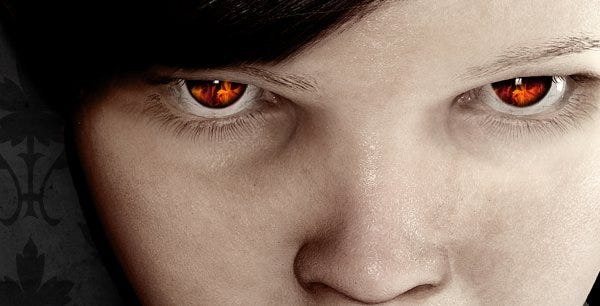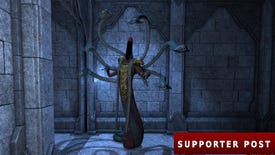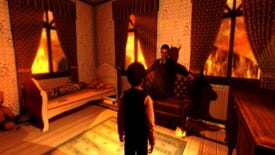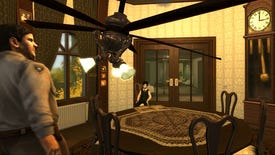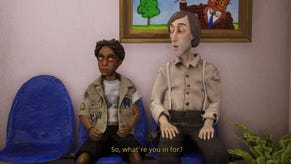Wot I Think: Lucius
A Bit Ominous
Lucius arrives on the 26th of October, just in time to be played as you close the curtains and ignore trick or treaters on Halloween. It's a 3D adventure inspired by horror classic The Omen, and it's been developed by three-man Helsinki-based, Shiver Games. But are spines chilled? Are hairs raised? Most importantly: are brains teased? Having played an early copy of the game I feel obliged to tell you Wot I Think.
The scene is set on a stormy night, with a chap lighting a lot of candles, while wearing a red cowl, in a dark room, with ominous chanting music playing. At the same time, a child is being born. Discerning gamers will, at this point, realise that SOMETHING IS AFOOT. And that something is nothing less than some no-holds-barred Satanism. It should be pretty clear from this point onward that bad things are going to happen. And so they do.
Jump forward to the sixth birthday of the child, and it's time for birthday boy to meet Lucifer in his bedroom. Old horn-scalp has a gift of his own for Lucius, and it's the power of telekinesis. If you're wondering why Dad never got you anything great for your birthday, then you'll be looking at Lucius and thinking “lucky bastard!” Sadly, though, he doesn't get to grow up to be a Jedi. The telekinesis – and a cheap flashlight for some reason – are Lucifer's way of telling little Lucius that it's time to start the killing. Other gifts come later: limited mind control, and the power to wipe peoples' memories. And yes, it's a game about murdering a well-to-do family and their servants, but thankfully no pets, since they don't have any. Nevertheless, it's sinister by way of eww.

It's at this point, where you're finally released into the house, that the nature of the game becomes clear. This is a game that is deeply entrenched in the heritage of the point and click adventure. While Lucius does take advantage of some aspects of its 3D engine – providing you with a lavish, spooky house, full of things that can be picked up and then dropped again - the heart of the challenge is a process that will be familiar to adventure gamers for time immemorial (albeit with a theme of familial murder): finding out what needs to be done to kill your mark, searching the house for items that might be useful, combining them in the inventory if necessary, and then working out how to apply them in the sequence that will result in horrible – sometimes comically horrible – death for the people of Dante Manor. The puzzles are never too tricky, although they can be obscure. Nor do they generally give much intellectual payoff: the victory is in the gory demise, with Lucius watching, unmoved.
After a couple of murders you have the run of the house, and the challenges begin to open up a little. Grisly death follows comedy death-rattle. It's not supposed to be funny, I should stress, it's just one of those games which straddles the humour equivalent of the uncanny valley, where sometimes the death of the game's computer people is very dark, and where sometimes their blank-faced unnaturalness (the characters are pretty crude, by contemporary standards) just makes it seem bizarre, and therefore amusing.
Perhaps that's just me.

Anyway, I have two observations about how Lucius works as a game. The first is that in tantalises you with some things – being able to pick up items around the house for example – but doesn't do much with them. There's a bit where you have to avoid being seen, but no actual stealth. As satan-child, I wanted to sneak. There are some side-missions you can do, fetching and carrying things for people, which allow you to unlock some additional toys, including a trike (which can, nightmarishly, ride right up a staircase), but these are never part of the core challenge. It's draping the flesh of a 3D game over the skeleton of an adventure game, and the resulting beast sometimes moves a little peculiarly.
The second observation I have is that the details seal the deal with this particular devil. The threatening pulse you get from crucifixes around the house – turning them upside down, Satan-style, removes it – the shadow cast by Lucifer's head, the weird things that grandpa says as the plot unfolds... it's all just so.
Shiver are a small team, and they've obviously hit limits in what they've been able to achieve in terms of technology and content, but they have hit their mark with the 1970s horror movie tone throughout. The music, the characters, and the house itself, are all pitch-perfect. That alone makes this a promising first outing for this studio.

There are also a few small technical quibbles – like some of the scenery popping into existence as you navigate the huge house – there's really no excuse for that – and the other is that there are points in the game where the characters are just repeating the same line of dialogue over and over as you pass them back and forth in the house. It's an age old quibble, but recording just a few more lines of chatter usually fixes it.
My conclusion, such as it is, is one that might read a little unfairly, because it's judging the game, to some extent, on what it does not do. What it doesn't do is ever really open up to allow you to be a bit more inventive than the conditions-for-murder require. When I first saw this game unveiled I'd sort of hoped for a Hitman-with-Satan's-kid, but actually it's just an adventure game that gives you the third-person run of the house.

That's fine – because it works under that remit – but it nevertheless ended up feeling restricted, like a tutorial segment of a game feels restricted, all the way through. Perhaps that's down to the lack of complexity in the puzzles... but if they were more complex, would the game be impossible? I'd better stop speculating. What I am trying to say is that I expected it to become more than it was, but it never did. Hopefully, of course, the game will do well enough for Shiver to expand on the theme and actually make this a first step in a wider project of supernatural murder 'em ups. Perhaps they'll also take a step beyond the rigid adventure game template, too. But perhaps not.
I like Lucius, and I found it compelling. I wanted to see what happened, even as I found myself occasionally annoyed by obtuse answers to the death-puzzlers. It does not, however, ever quite hit the inventive highs of the great adventure games that it takes inspiration from, and nor does it really make the most of the setting – a child with the run of a huge, spooky mansion – that it has created for itself. Lucius is interesting, atmospheric, but is unlikely to leave its mark on history. And that's a shame.
Lucius is born on 26th of October 2012.
